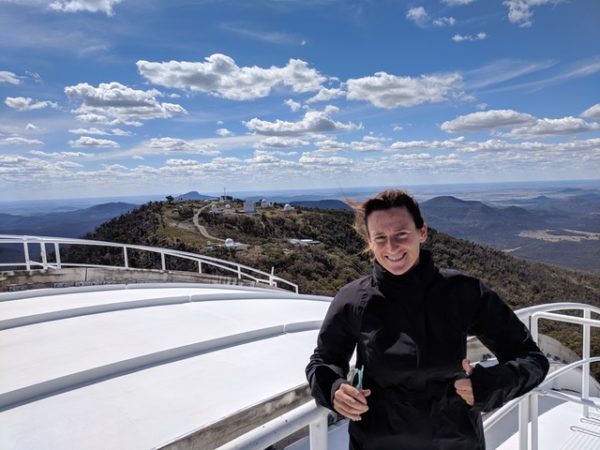 What is your position or role in the DESI project?
What is your position or role in the DESI project?
I’m a theoretical cosmologist, who also has a lot of expertise in redshift surveys through the WiggleZ Dark Energy Survey and the Australian Dark Energy Survey (OzDES) on the Anglo-Australian Telescope. At the moment I’m helping lead the visual inspection of survey validation data, focussing on quasars. I am also helping out on the DESI membership committee and external collaborator committee.
Where were you born?
I was born in Sydney, Australia.
Where do you live now?
I now live in Brisbane, Australia.
What do you as part of DESI?
At the moment I am spending a lot of time looking at some of the first spectra to come through the DESI instrument. We are making sure the spectra are of high quality (they’re amazing!) and that our analysis software is giving the correct results for the redshift of each object we look at.
At the same time I’m still working on cosmology theory, and seeing how our data can best test theories of dark energy and dark matter that go beyond our standard cosmological model.
What is the most interesting or exciting thing about DESI?
I think one of the coolest things DESI will do is measure the mass of neutrinos. When starting out in cosmology I never thought that making the largest ever map of the distribution of galaxies in the universe would help us understand the properties of one of the most enigmatic particles in the standard model of particle physics. But the neutrino mass has an impact on the formation and growth of structure in the early universe, so we can detect its effects with DESI. Feels to me like a great demonstration of the fundamental interconnectedness of all things (to borrow a Douglas Adams quote).
Any advice for an aspiring scientist?
Enjoy it. It’s a privilege to be able to do research. It’s an amazing career. However, I see many junior researchers stressing over their future, when they really don’t need to! There are so many great things you can do with the experience you gain from a PhD, and your skills will be in high demand in all sorts of industries. My trick to stay relaxed and happy in research is this: don’t go into it expecting to do it forever, and don’t stress about whether you’ll get your next job in research or not… just be appreciative of the time you do get to do it. Funnily enough if you use that technique, you may just find yourself succeeding beyond your wildest dreams! I once asked my PhD supervisor if I was doing okay in my PhD. He asked me “Are you enjoying it?” I responded, “Yes.” So he said, “Then you’re doing it right.”
There’s lots of other advice I could give, but that’s my main one.
What do you do for fun?
My main fun-time thing to do is play Ultimate frisbee. I’ve played all sorts of sports over my life, but Ultimate is the one that has occupied me since my PhD. I have played all around the world, and represented Australia at seven world championships. I love it, and the people skills, leadership, and resilience I learnt from playing sport has definitely helped me in my career as an astrophysicist.
